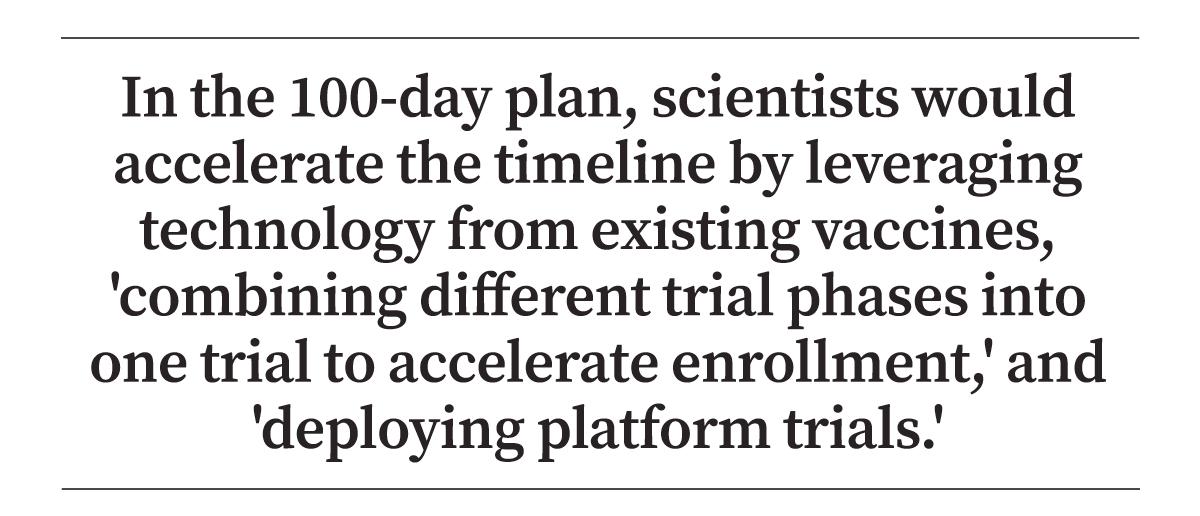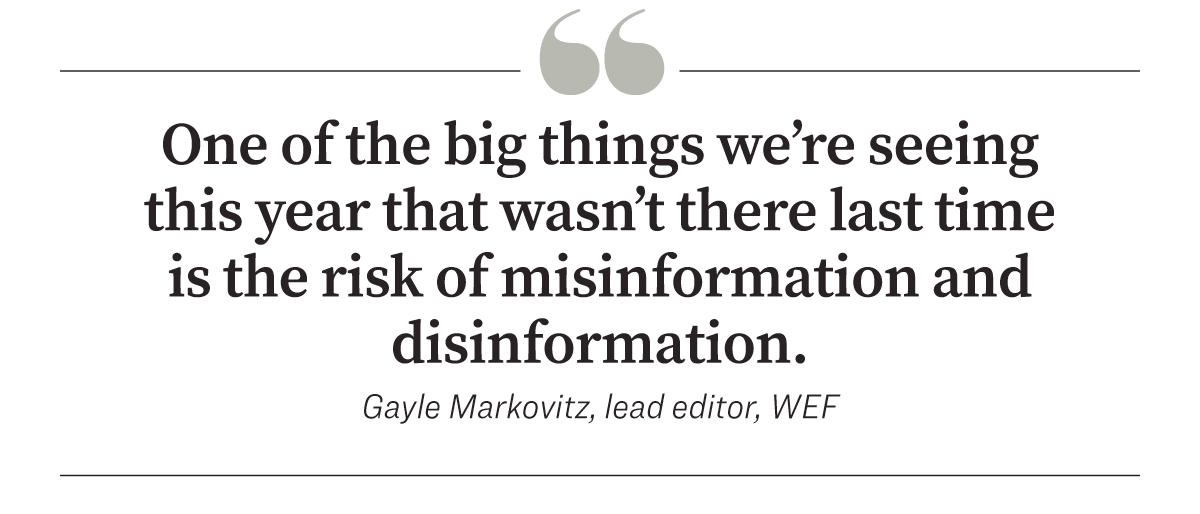The top concern for the next two years is not conflict or climate, it is disinformation and misinformation, says the European Commission president
Global organizations are working to build a permanent, globally controlled state of readiness for the coming of the heralded “Disease X.”
Speaking at a World Economic Forum (WEF) seminar called “Preparing for Disease X,” World Health Organization (WHO) director-general Tedros Adhanom Ghebreyesus stated that in 2018 his organization “needed to have a placeholder for the disease we don’t know.
“And that was when we gave the name Disease X,” he said on Jan. 17. “We were preparing for Covid-like diseases, and you may even call Covid the first Disease X.”
Since then, global organizations such as the WHO, the WEF, the World Bank, the G7, and the G20 have been working to build a global infrastructure to fight the next pandemic, in whatever form it takes.
The ‘100 Days Mission’
To cope with the spread of such viruses, the Norway-based Coalition for Epidemic Preparedness Innovations (CEPI) was created at the WEF’s 2017 Davos summit as a self-described “global partnership between public, private, philanthropic, and civil society organizations.”
According to this report, it took between 326 and 706 days “from the day the COVID-19 sequence was made available until emergency use authorization by a stringent regulatory authority or issuance of an Emergency Use Listing by the World Health Organization.”
CEPI’s plan would make vaccines available within 100 days, during which time “non-pharmaceutical interventions” would be employed to slow the disease’s spread.
During COVID-19, non-pharmaceutical interventions included testing, contact tracing, social distancing, surveillance, lockdowns, travel restrictions, and bans on gathering for family events or church services.
In the 100-day plan, scientists would accelerate the timeline by leveraging technology from existing vaccines, “combining different trial phases into one trial to accelerate enrollment,” and “deploying platform trials, such as “WHO’s Solidarity,” in which hundreds of hospitals in dozens of countries collaborate to assess the vaccine’s risks and benefits.
Then, companies and government agencies would rapidly manufacture the first batch of experimental vaccines for human use.
Before Disease X arrives, the global community must establish rapid response platforms and build vaccine libraries, CEPI states.
Once X arrives, the focus will switch from prototype vaccines to rapid production of “pathogen-specific” treatments. From there, officials would distribute the vaccine to populations and evaluate its effects.
The report’s authors state that “we acknowledge that enabling the 100-day aspiration would come with a number of risks which would need to be extensively evaluated in advance of a pandemic, and the goal should be pursued only if the right safeguards … are put in place.”
Centralizing Authority
The focus of the accord and amendments is to centralize coordination of supply chains under the WHO’s direction, to share information about diseases and treatments among members, to ensure “equity” of health care among all nations, and to create a “whole-of-government and whole-of-society approach” to pandemic response within member countries.
The WEF, the WHO, and other global leaders are worried that, in a time of crisis, people can be misled by incorrect ideas.
“We thought the internet would democratize information and bring transparency to the world, but pretty much the opposite has happened,” Peter Giger, chief risk officer at Zurich Insurance and one of the report’s authors, said.
“People basically live in their bubbles and don’t even recognize what’s happening outside.”
The WHO also considers misinformation a threat that must be “tackled.”
Its draft accord states that member nations will “conduct regular social listening and analysis to identify the prevalence and profiles of misinformation.”
Mistrusting ’the Science’
This global effort to control narratives comes at a time when many people distrust what has become known as “the science,” as well as official narratives about what’s good for them. During COVID-19, people were misled regarding information about the efficacy of masks and the benefits of closing schools, while many refused to take the vaccines that were offered.
Poorly constructed models from organizations such as the Imperial College of London dramatically inflated the number of projected deaths from COVID-19, sparking terror through compliant populations.
In Canada, truck drivers who protested the government’s Covid restrictions had their bank accounts and credit cards frozen and their insurance suspended in what proved to be an effective collaboration between government and private companies.
Physician Meryl Nass, an outspoken critic of efforts like the WHO pandemic accord, says her license to practice medicine in her home state of Maine was suspended as the result of her disobeying state Covid mandates.
She describes the efforts by global and local health officials to assume authority in the name of fighting diseases as “a soft coup.”
“They have to maintain control of the narrative; they will not be able to succeed without that,” Dr. Nass told The Epoch Times. “And one part of controlling the narrative was controlling the doctor narrative, the medical narrative.”
Silencing Dissent
Nonetheless, the WEF warns that if misinformation and disinformation are not brought under control, censorship could become the norm.
“In response to mis- and dis-information, governments could be increasingly empowered to control information based on what they determine to be ‘true,’” the WEF report states.
“Freedoms relating to the internet, press, and access to wider sources of information that are already in decline risk descending into broader repression of information flows across a wider set of countries.”
To underscore this point, plaintiffs in the case of Missouri v. Biden, currently under appeal before the Supreme Court, allege that the Biden administration pressured social media companies to censor posts that went against the government narrative about Covid origins, vaccines, and political issues.
Also noting that 3 billion people will be voting in elections worldwide this year, the WEF risk report states that “the widespread use of misinformation and disinformation, and tools to disseminate it, may undermine the legitimacy of newly elected governments [and the] resulting unrest could range from violent protests and hate crimes to civil confrontation and terrorism.”



